INTERVIEW: FIRE & DUST MEETS MERVYN SEIVWRIGHT
In the summer of my late teens my best
friend’s father fathered me on things I thought
men should do. Away in Athens, nested
amidst dogwood trees, fields with lavender
wildflowers, blended in green tinted meadows
in Tennessee. I learned to listen to crickets
build networks where telephones may not ring
often. A neighbour called my best friend’s father’s
father and asked if he had hired help.
Just my Korean grandson and his black best
friend. My best friend’s father spoke about girls,
intimacy while driving on Tellico Mountain
roads, as each car passed, he pushed my head down,
shrouded my skin from folks with hatred for brown.
_______________________________– From Athens to Tellico, Tennessee
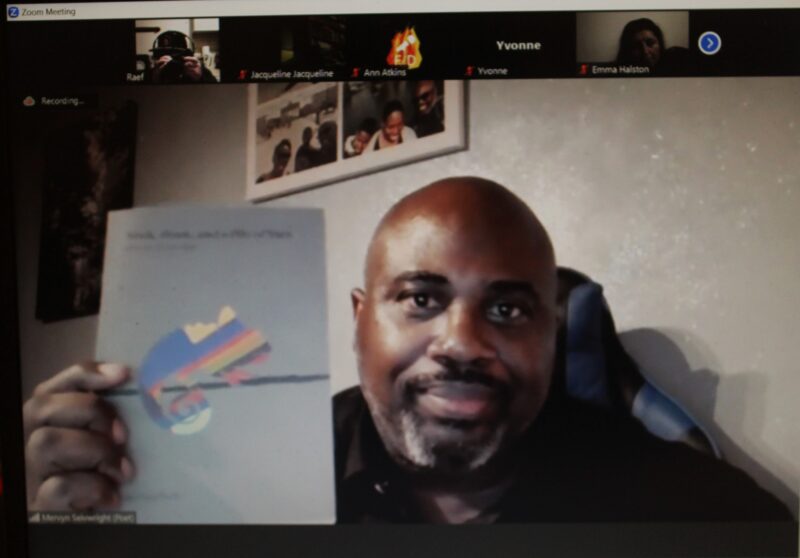
Mervyn Seivwright writes to balance social consciousness and poetry craft for humane growth. Now residing in Schopp (Germany), he is a nomad from a Jamaican family who was born in London, raised in Ipswich, and left the UK to live in America aged ten. He travelled the globe during his twenty-two years in the United States Air Force, during which time Mervyn took part in performance poetry and self-published seven full collections of poetry. Mervyn is a Spalding University MFA graduate and has appeared in AGNI, American Journal of Poetry, Salamander Magazine, African American Review and sixty-three other journals across ten countries, receiving recognition as a 2021 Pushcart Nominee and honourable mention in Voices Israel’s Rose Ruben Poetry Competition. A few notable appearances on stage include featuring as a finalist at the UK’s Word-for-Word National Poetry Slam, opening for Def Jam’s Comedian Bruce Bruce in Florida, and winning first place at Cafe Kraaij & Balder Poetry Slam in Eindhoven (The Netherlands). Mervyn’s most recent collection – Stick, Hook, and a Pile of Yarn – was published with Broken Sleep Books in September 2023.
Following an in-person open mic performance at The LTB in Coventry, we invited Mervyn to be the guest headliner at our virtual Fire&Dust poetry night for November 2023. Material from his new book was well-received by the crowd, and we caught up with him after the gig, to ask a few questions…
HCE: Tell us a little about your background and journey as a writer so far. What inspired you to start creating and performing poetry?
MS: My family came to England from Jamaica between the late 50s to mid 60s, mainly to London and Ipswich. My mother later met an American service man several years after the marriage with my father ended. This new relationship moved us to America when I was age ten. The transition was the spark for my poetry as the move was challenging for me.
It wasn’t until my freshman year at the University of Tennessee Chattanooga where I wrote and performed my first poem, which was later published along with a few more in the university paper. I believe once these two major events planted themselves, poetry was no longer something I did, it was who I was, how I breathed.
HCE: Who is your work aimed at – do you have an ideal audience in mind when you’re putting a poem together?
MS: It depends. Such a response, right. I write for myself first in most cases. Whether it is influenced by a walk in the forest two blocks from my home, a sunrise walk visiting a new city waking up, a series on a historic subject, or me searching for myself in the mirror, presence and past to the ancestors. I also write commissioned work, which always has been for a particular audience. Though, I remember my professor always telling me, “who is your audience”, though I believe that is not a question of content, but a question of craft and that the craft in what you write meets the approval of the gatekeepers of literary journals and publishing houses for your words to have a chance to breathe off the page.
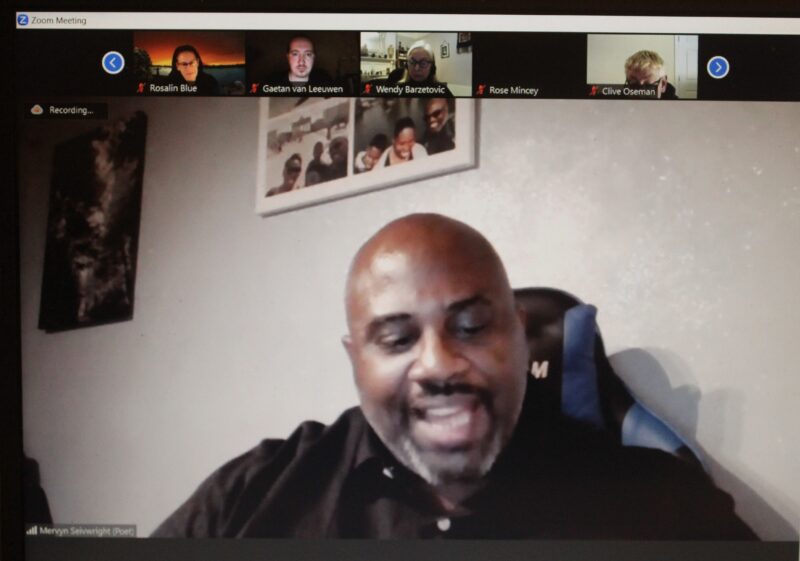
HCE: Would you say there are themes or motifs that you gravitate to in your work?
MS: I may be saying it depends quite often in this interview. Lol. I am a multi-collection writer. I have at least five collections at work, slow and steady, each have their own motifs. The collection Broken Sleep Books just published, Stick, Hook, and a Pile of Yarn, uses crochet, chess, and chameleon motifs throughout the collection literally crocheting the collection together.
HCE: Is there a particular message you’re hoping that readers take away from Stick, Hook, and a Pile of Yarn?
MS: The arcs in Stick, Hook, and a Pile of Yarn address immigration trials in a new country which is an apparent issue in these days. It looks to the writer’s struggle for a father relationship in father, step-father, and pseudo-father, but the writer addresses a fatherly message at the end. There is also some racial turmoil attached to the writer’s coming to age story. In each of these arcs there is so much to take away, but I do not believe in leading the reader into what that is.
HCE: Do you enjoy the process of putting together a collection?
MS: From my childhood, I loved puzzles. My mum used to buy them often and we would do them between my mum, my brother, and I. Poems and poetry collections allow me to build the puzzle. I first build the poems with layers of words, sounds, structures, and moods. Then shift those dimensional poems into an extended narrative. It is a definite joy. I will say books like Ordering the Storm helped me understand the collection puzzle process recommended by my mentor and poet Dr Douglas Manual.
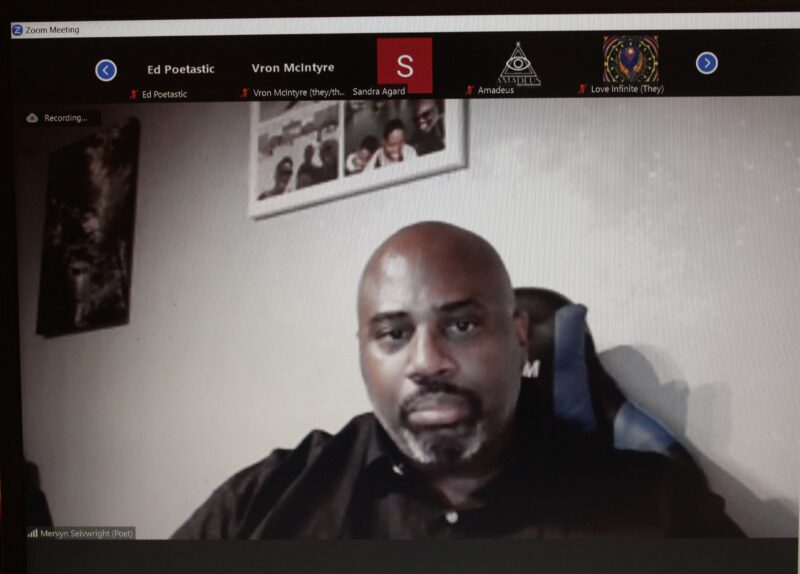
HCE: What have responses to your new book been like? Are readers connecting with the material in ways you hoped they would?
MS: My book is new, but I am starting to get feedback from readers. They are sharing their favourite lines and poems. They are sharing memories they align with and sharing moments of joy or tears. About forty percent of the poems were published in journals across Canada, America, England, and Norway allowing me to get feedback from the impact of some of these poems prior. I am still waiting for feedback for this collection as a whole since this is more of a memoir than just a collection of poems synced together.
HCE: You have a good track record when it comes to performing in poetry slams. Do you enjoy that competitive side of the spoken word scene, and what are some essential ways to prepare for a slam?
MS: This is an interesting question for me. I was never a big fan of slams or the fact that expressions of words must compete. I do not write what some call slam poems, as I do not write poems to compete. I write for the beauty of what a poem is and can do. If while competing, it appeals to the judges, then it does. Slams have just been a way in my younger years to be heard for a larger audience or to invigorate young writers into poetry creating events for them. In this season of my writing career I do not participate in poetry slams.
HCE: Does Schopp have a thriving literary scene and have they embraced you as a non-native poet? In your opinion, having experienced life in so many different countries, what makes a city a good place to be a writer?
MS: I last lived in Germany from 1999 to 2003; during that time, I travelled all over mainland Europe seeking any type of poetry event. During that time, Germany had the second biggest poetry slam community next to America. I would go to Cologne, Bonn, Frankfurt, Heidelberg, and Munich for major events including poetry slams. In addition, the Netherlands and France had good poetry cultures even for me as an English speaking poet.
My town of Schopp, outside city Kaiserslautern, there are only approx. 1500 people. I find refuge with several tens of trails I walk and write in. It is inspiring a nature collection I am writing now while providing clarity to write on other things. Paris probably has the closest English-speaking true poetry events that are not poetry slam, from where I live. It is about four and a half hours from me. I last experienced a couple of events there last summer and stay connected to that community.
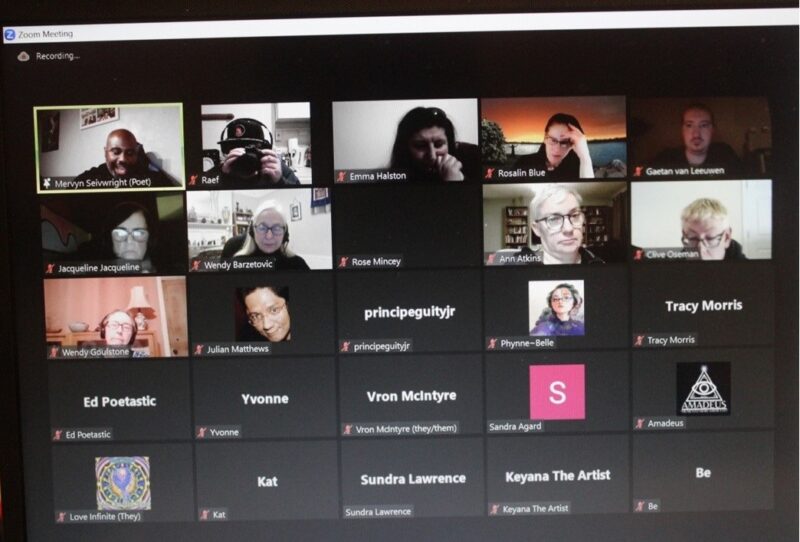
HCE: Have you observed any stand-out cultural differences between poetry events in the USA and Europe compared to in the UK? Are there things other countries are doing much better that we should consider adopting over here?
MS: I am not sure I can answer this question in a quick setting. I believe this is a research paper of my life from Germany, Netherlands, France, Canada, America, and the UK. I am quoted on a PhD paper (‘Identity, Interaction and Influence in UK and US Poetry Slam Discourses’) by a HF Gregory, back when I lived in the UK between 2004 and 2008. She went into deep research of comparison poetry cultures. I don’t believe there is a direct distinction as individuals in either country are different within their cultures. I have grown up between both.
HCE: Are you a keen reader of poetry? Which collections/performers have recently made an impression on you?
MS: Wow, where do I begin. First, I would say you have to read, to grow as a writer. I am a fan of anything Pablo Neruda, Robert Haden, Yusef Komunyakaa, and W.H. Auden. A couple of my favourite collections are Olio by Tyehimba Jess, Portable Paradise by Roger Robinson, Pepper Seed by Malika Booker, The Geez by Nii Ayikwei Parkes, The Actual by Inua Ellams, Trouble Funk by Douglas Manuel, House of Lords and Commons by Ishion Hutchinson, Citizen by Claudia Rankine and Duppy Conqueror by Kwame Dawes. I still feel this list can go on. I analyse their work to produce a better me in craft, as their words and their thoughts are theirs. I love how these poets make their puzzles.
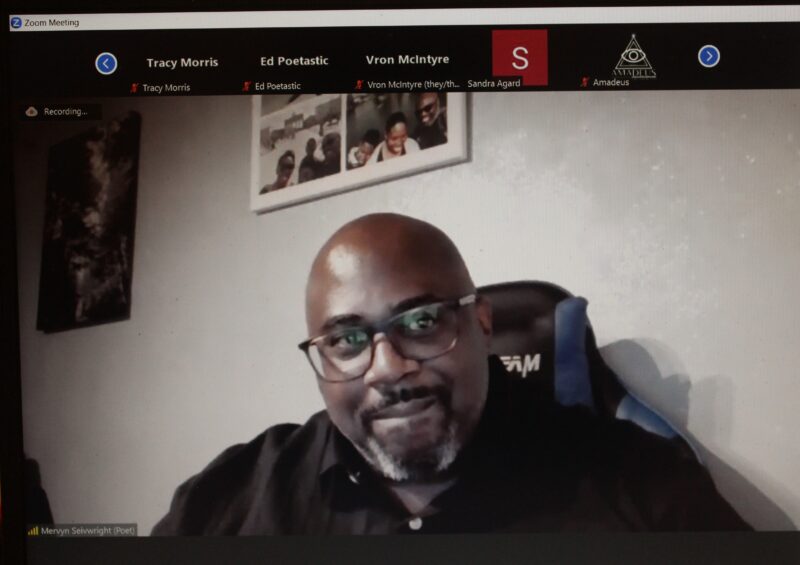
HCE: As a reader, what elements in common do you notice are shared by poems that appeal to you the most?
MS: The craft traits in poetry that I love most are use of sensory details similar to Pablo Neruda’s work. I enjoy musicality of words in sound and craft tools like alliteration or consonant/assonate pairings. I like seeing the use of enjambments for pacing and I like line breaks in the way they can bring duality in meaning as well as a welcome surprise to following lines.
HCE: Stick, Hook, and a Pile of Yarn features various forms, including an erasure poem, two contrapuntal poems and five poems divided into distinct, numbered parts. Does your writing process involve a lot of experimentation with form, or do certain poems cry out on arrival to be structured in a particular way?
MS: This question is interesting for me. For someone coming from spoken word, I have been called a formalist by some.
My title poem Stick, Hook, and a Pile of Yarn is a sestina. In addition, there is a villanelle, a pantoum, a tanka, and sonnet variations. I believe form challenges us a poets. To your question, I learned we had to know the rules before we can break them, then we can break or experiment with specific intention. We can allow of the form or structure to properly house the voices we use in poems. The title poem is an example of that as a poetry form, sestina, that weaves as the writer speaks about the crocheting of life.
There is a 9-part poem woven between the 3 sections but printed as one poem in The Cape Cod Poetry Review. I use couplets for closeness and tercets for challenges, the shapes of the poems are for specific intentions.
HCE: Much of the poetry in this collection deals with your own experiences, including childhood struggles, painful moments within the family and encounters with racism. Do you find writing honestly like this an emotionally draining thing to do? What is the top piece of advice you would give other poets for tackling heavy/personal topics in their writing?
MS: This collection is a memoir. My history in spoken word embraced persona poems, not facing myself. I made a change but understood I would be searching for my vulnerabilities in the mirror with this collection. It was a process. The important thing with the first draft was to just write and let go. When you come back to the draft, remember that moment of emotion was in the first draft, it is a person in the past. When I come back to that draft, it is as looking at the writing as if it is any writer you are editing. The past voice is no longer you in this moment.
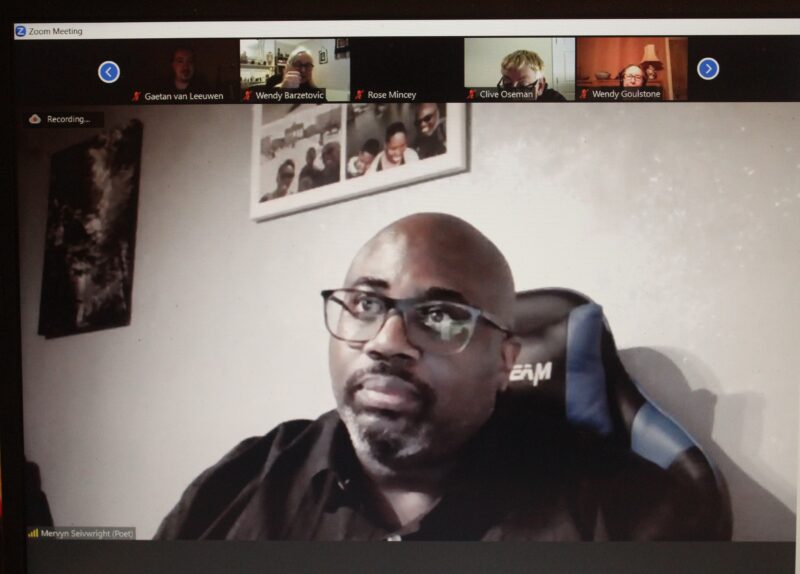
HCE: What’s next on the horizon for you? Are you already working on projects/booked for upcoming performances?
MS: I do not have any events scheduled, but I am always writing. I have a full collection and a pamphlet that are about ready and searching for publishing homes. In addition, another collection close with two more in more infant stages. I am always sending poems for publication in literary journals globally. These two poems in this link came out from Writer’s Block Magazine by the University of Amsterdam, Netherlands this past week. See my poems on pages 16 to 18.
HCE: What’s the best way for people to keep connected with you and your work, or contact you about bookings?
The best way to contact me or see my new work is on my portfolio. It is the Clippings link mentioned below. Through the CV page you can get my direct contact information as well as my history of work in the life of poetry.
Clippings Twitter Instagram Facebook
HCE: Is there anything we didn’t cover that you’d like to share with our readers?
MS: Thank you for the time, effort, and support of my work.
Mervyn’s book Stick, Hook, and a Pile of Yarn can be purchased online direct from publisher Broken Sleep Books, as well as other bookshops and retailers.
